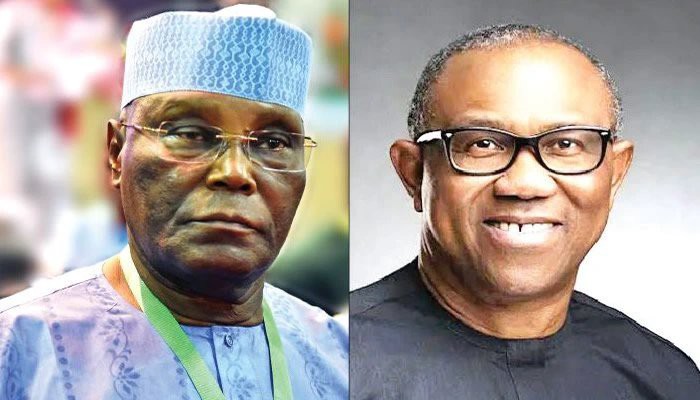An ally of former Vice President Atiku Abubakar has disclosed that the PDP stalwart is prepared to work with Peter Obi.
Obi was the 2023 presidential candidate of the Labour Party and a former governor of Anambra State.
This alliance, according to the source, aims to challenge and possibly unseat President Bola Ahmed Tinubu in the 2027 general elections.
Atiku came second in the 2023 presidential poll, securing 6,984,520 votes, while Obi followed closely with over six million votes.
President Tinubu was declared the winner with more than eight million votes under the All Progressives Congress (APC).
According to Diaspora digital media (DDM) reports, since then, Atiku has consistently voiced his intention to lead a broad and effective opposition coalition.
Observers believe this coalition could tilt the balance in future elections, especially if it unites powerful political forces.
Tinubu’s grip on power is increasingly being tested, not just by external opposition, but by internal dissent within the APC.
Some former APC heavyweights, including ex-Attorney General Abubakar Malami and former Secretary to the Government of the Federation Babachir Lawal, have grown critical of Tinubu’s leadership.
Notably, Nasir El-Rufai, the former governor of Kaduna State, recently resigned his APC membership.
El-Rufai did not just leave the party; he joined the Social Democratic Party (SDP), marking a significant political shift.
He openly criticised Tinubu’s government and called on patriotic Nigerians to unite and save the nation from APC dominance.
His defection has triggered fresh rumours about a looming political realignment ahead of the next elections.
Sources close to Atiku suggest that strategic behind-the-scenes negotiations are already in progress among various opposition stakeholders.
Speaking anonymously to The Punch, one of Atiku’s allies claimed that both Atiku and Obi now understand the necessity of working together.
“They have learned from past mistakes and realised they cannot defeat Tinubu by going it alone,” the source stated.
According to him, 2023 election data reveals that Atiku won 12 states while Obi captured 11 states and the Federal Capital Territory.
Their combined vote tally would have comfortably surpassed Tinubu’s winning figure of just over eight million.
He said meetings are currently taking place quietly between their camps to forge a strong political alliance.
The source also accused President Tinubu of attempting to divide the country along regional lines for political gain.
He alleged that such divisive tactics contributed to El-Rufai’s departure from the ruling party.
While opposition camps discuss unity, supporters of the APC remain confident about their party’s strength heading into 2027.
Dr. Lanre Adebayo, Director-General of The Progressive Institute, stated that no opposition party presently poses a serious threat to the APC.
He made this assertion during a courtesy call to the Deputy Senate President, Jibrin Barau, at the National Assembly.
The Progressive Institute is a think tank created by the APC to train young leaders and promote democratic values within the party.
Adebayo insisted that 2027 is not far away and no existing opposition structure can rival the APC’s national presence.
He added that his organization is actively reviewing the APC’s performance as part of efforts to keep the party responsive and resilient.
He maintained that the APC remains the guiding political force for Nigeria’s future.
Senator Jibrin Barau praised the institute’s activities and applauded APC National Chairman Abdullahi Ganduje for strengthening internal party structures.
Meanwhile, the New Nigeria People’s Party (NNPP) has declared openness to forming a coalition against Tinubu.
The party’s National Publicity Secretary, Ladipo Johnson, said the NNPP initiated coalition talks immediately after the 2023 elections.
He confirmed the party is still open to dialogue with other parties and political actors ahead of 2027.
However, Johnson emphasised that any coalition must preserve the NNPP’s independent identity.
He warned that the party would not accept an arrangement that erases its name or core values.
He also revealed that the NNPP would soon make public its assessment of Tinubu’s administration, especially after May 29, when it marks two years in office.
In a similar tone, the African Democratic Congress (ADC) voiced its support for a coalition built on shared values and integrity.
ADC National Chairman Ralph Nwosu welcomed alliance efforts but warned against alliances formed solely for power grabs.
He strongly criticised the Tinubu administration for encouraging division rather than fostering unity and development.
Nwosu also condemned former Delta State Governor Ifeanyi Okowa for joining the APC, describing it as opportunism.
He questioned the quality of Nigerian democracy if public officials defect for personal benefits rather than developmental goals.
According to him, true democratic leaders in developed nations focus on progress, not political survival.
The Young Progressive Party (YPP) echoed calls for a united front but added a strong caution about the faces leading it.
Wale Egbeola-Martins, the party’s National Publicity Secretary, said the idea of a coalition is valid but must avoid recycling old elites.
He expressed concern that a coalition led by figures like Atiku, El-Rufai, or Babachir Lawal could fail to meet public expectations.
He urged elder politicians to step back and allow younger, more competent leaders to emerge.
Egbeola-Martins stressed that Nigerians are no longer content with political rebranding; they want real change.
He also warned against the wave of defections into the APC, arguing that it threatens Nigeria’s political diversity.
According to him, such trends could lead to a dangerous one-party system that erodes democratic checks and balances.
He insisted that democracy only thrives when multiple parties with different ideologies can effectively compete.
As coalition discussions deepen and political alliances shift, the stage is being set for a major political showdown in 2027.
Observers are watching closely to see whether these opposition groups can overcome ego, regional divides, and past failures to mount a credible challenge.
The outcome of these talks could shape Nigeria’s political landscape for years to come.



